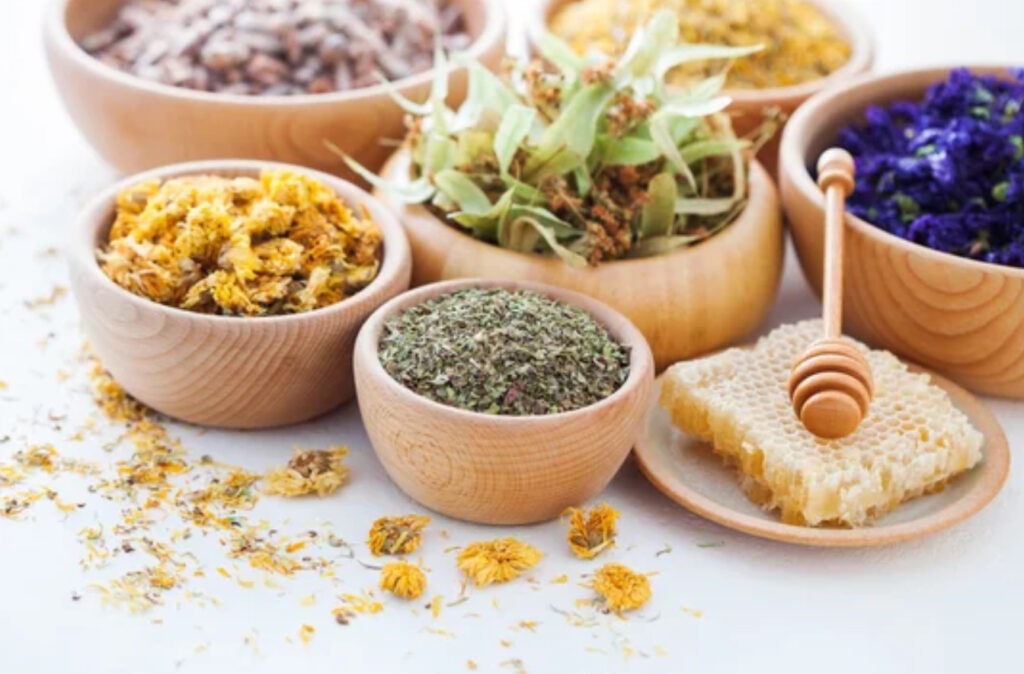What is Herbal Medicine Therapy?
 Herbal medicine, also known as botanical medicine or phytomedicine, involves using plants or plant extracts like seeds, berries, roots, leaves, bark, or flowers to treat illnesses and enhance overall health. It has ancient origins and is used to prevent or cure disease, relieve symptoms, boost energy, relax, or lose weight.
Herbal medicine, also known as botanical medicine or phytomedicine, involves using plants or plant extracts like seeds, berries, roots, leaves, bark, or flowers to treat illnesses and enhance overall health. It has ancient origins and is used to prevent or cure disease, relieve symptoms, boost energy, relax, or lose weight.
Key aspects of herbal therapy:
- How it works Herbal medicine aims to restore the body so it can protect, regulate, and heal itself, taking a whole-body approach that considers physical, mental, and emotional well-being.
- Forms Herbal supplements are available in various forms, including tablets, capsules, powders, teas, extracts, and fresh or dried plants. They can be swallowed as pills, brewed as tea, used on the skin as gels or creams, or added to bath water.
- Regulation Herbal remedies are a type of dietary supplement but are not regulated or tested like medicines.
- Western herbal medicine Focuses on treating the whole person, considering their health history, family history, diet, and lifestyle, and commonly uses European and North American herbs.
- Traditional Chinese Medicine (TCM) Uses hundreds of medicinal substances from plants, combining different plant parts into teas, capsules, tinctures, or powders.
Common Herbs Used and Their Potential Benefits:
- Chamomile: Used as a remedy for nausea and upper respiratory infections.
- Dong quai: Used for gynecological complaints such as premenstrual tension, menopause symptoms, and period pain.
- Echinacea: Used to stimulate the immune system and aid the body in fighting infection.
- Elderberry: Primarily marketed as a treatment for symptoms associated with the flu and common cold.
- Turmeric: Contains curcumin, known for its anti-inflammatory and antioxidant properties, which may inhibit the growth of cancer cells. To increase absorption, it can be mixed with black pepper and olive oil.
- Ginger: May effectively reduce nausea (including motion sickness), vomiting, and pain associated with cancer treatments. It also exhibits anti-inflammatory and anticancer effects in lab studies.
- Garlic: Used to reduce the risk of heart disease and fight colds and respiratory infections. May reduce tumor growth and help protect healthy cells from damage caused by chemotherapy drugs. It also helps boost the immune system.
- Ginseng: Generally used to treat fatigue. May reduce inflammation and cancer tumor growth and protect healthy cells from damage.
- Essiac Tea: Contains herbs known for their immune-boosting effects and is rich in antioxidants.
- Cayenne Pepper: Contains capsaicin, a powerful antioxidant and anti-inflammatory compound that is toxic to cancer cells and helps prevent their growth.
- Ginkgo: Used to treat poor blood circulation and tinnitus. Contains ginkgolides, which possess anti-inflammatory, antioxidant, and anticancer properties.
It is important to consult with a healthcare provider before using herbal medicine, as some herbs can cause harm or interact with medications.
What Herbal Medicine Therapy Treats:
- Allergies and Asthma: Herbal medicine is used to treat allergies and asthma.
- Anxiety and Depression: Herbal medicine can help people relax and cope with anxiety and depression. St. John’s wort is known for its antidepressant effects. Valerian root is often used as a natural sleep and anti-anxiety aid.
- Cancer: Herbal medicine is one of the most used complementary and alternative therapies by people with cancer. Some herbal remedies might prevent or relieve cancer symptoms and help with treatment side effects.
- Cardiovascular Conditions: Garlic is generally used for cardiovascular conditions, including high cholesterol and triglyceride levels linked to atherosclerosis. Other herbs are used for several heart-related conditions, such as angina, atherosclerosis, heart failure, and high blood pressure.
- Chronic Fatigue: Herbal medicine is used to treat chronic fatigue.
- Colds and Flu: Echinacea is used to stimulate the immune system and aid the body in fighting infection, such as colds and flu. Elderberry is primarily marketed as a treatment for symptoms associated with the flu and common cold.
- Eczema: Herbal medicine is used to treat eczema.
- Gynaecological Complaints: Dong quai is used for gynaecological complaints such as premenstrual tension, menopause symptoms, and period pain. Feverfew’s pain-relieving properties have been used for menstrual cramps.
- Irritable Bowel Syndrome: Herbal medicine is used to treat irritable bowel syndrome.
- Migraine: Herbal medicine is used to treat migraine. The pain-relieving properties of feverfew have been used for migraine headaches.
- Nausea: Ginger has been shown to be useful in treating nausea, including motion sickness and morning sickness. Chamomile has been used as a remedy for nausea.
- Prostate Issues: Saw palmetto is used for the treatment of benign prostatic hyperplasia (BPH), a noncancerous enlargement of the prostate gland.
- Respiratory Infections: Garlic’s antibiotic and antiviral properties mean that it is also used to fight colds, sinusitis, and other respiratory infections. Chamomile has been used as a remedy for upper respiratory infections.
- Rheumatoid Arthritis and Fibromyalgia: Herbal medicine is used to treat rheumatoid arthritis and fibromyalgia.
It is best to take herbal supplements under the guidance of a trained provider. Since herbal medicines can potentially interact with prescription medications and may worsen certain medical conditions, be sure to consult with your doctor or pharmacist before taking any herbs.
Learn More about Herbal Medicine Therapy at UAC…
Contact Urban Acupuncture Center in Columbus, OH For More Information and Treatment Options
For more information about how acupuncture, massage therapy, electroacupuncture and other alternative healing treatments can help you, please contact the Urban Acupuncture Center Board Certified Licensed Acupuncturist’s team at Indianola Ave, Columbus, Ohio (Clintonville) (614) 725-2488 or click here. Taking new patients in and around greater Columbus, Ohio.
